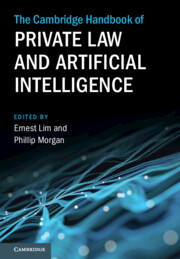Book contents
- The Cambridge Handbook of Private Law and Artificial Intelligence
- Reviews
- The Cambridge Handbook of Private Law and Artificial Intelligence
- Copyright page
- Dedication
- Contents
- Figures
- Table
- Contributors
- Acknowledgements
- Abbreviations
- Introduction
- 1 AI for Lawyers
- 2 Computable Law and AI
- Part I Law of Obligations
- Part II Property
- Part III Corporate and Commercial Law
- 18 Corporate Law, Corporate Governance and AI: Are We Ready for Robots in the Boardroom?
- 19 Financial Supervision and AI
- 20 Financial Advisory Intermediaries and AI
- 21 Competition Law and AI
- 22 Sales Law and AI
- 23 Commercial Dispute Resolution and AI
- 24 Insurance Law and AI
- 25 Securities Regulation and AI
- 26 Employment Law and AI
- Part IV Comparative Perspectives
- Index
22 - Sales Law and AI
from Part III - Corporate and Commercial Law
Published online by Cambridge University Press: 21 March 2024
- The Cambridge Handbook of Private Law and Artificial Intelligence
- Reviews
- The Cambridge Handbook of Private Law and Artificial Intelligence
- Copyright page
- Dedication
- Contents
- Figures
- Table
- Contributors
- Acknowledgements
- Abbreviations
- Introduction
- 1 AI for Lawyers
- 2 Computable Law and AI
- Part I Law of Obligations
- Part II Property
- Part III Corporate and Commercial Law
- 18 Corporate Law, Corporate Governance and AI: Are We Ready for Robots in the Boardroom?
- 19 Financial Supervision and AI
- 20 Financial Advisory Intermediaries and AI
- 21 Competition Law and AI
- 22 Sales Law and AI
- 23 Commercial Dispute Resolution and AI
- 24 Insurance Law and AI
- 25 Securities Regulation and AI
- 26 Employment Law and AI
- Part IV Comparative Perspectives
- Index
Summary
The differences between AI software and normal software are important as these have implications for how a transaction of AI software will be treated under sales law. Next, what it means to own an AI system – whether it is a chattel, merely a software, or something more than a software – is explored. If AI is merely a software, it will be protected by copyright, but there will be problems with licensing. But if AI is encapsulated in a physical medium, the transaction may be treated as one of the sale of goods, or a sui generis position may be taken. A detailed analysis of the Court of Justice of the European Union’s decision in Computer Associates v The Software Incubator is provided. An AI transaction can be regarded as a sale of goods. Because the sale of goods regime is insufficient, a transaction regime for AI systems has to be developed, which includes ownership and fair use (assuming AI is regarded as merely a software) and the right to repair (whether AI is treated as goods or software).
Keywords
- Type
- Chapter
- Information
- Publisher: Cambridge University PressPrint publication year: 2024

